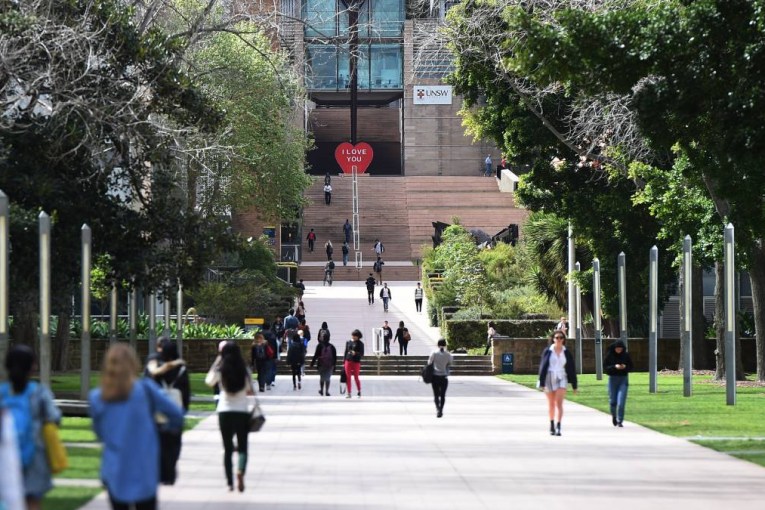How to leap the gap from school to further study

Not all young people want to go on to further study after they finish school. But the arguments for doing so – eventually at least – are powerful. Photo: Getty
Helping a young school-leaver to decide just how to take the next step in life can be tricky – especially if that young adult is reluctant to head into further study.
Yet helpful advice can be crucial to someone taking their first successful steps on their journey to an independent and, ideally, successful life.
What to tell them? Where even to begin?
It might that the young adult in your life has had enough of school and wants to immerse themselves in the fresh experiences of a gap year. That’s not as bad as it might seem at first.
“Taking time off after completing secondary school may actually be beneficial for a variety of reasons,” advises Ballarat’s Federation University in a handbook for parents, “particularly if your child is not sure what they want to do.
“This time can be an opportunity for your child to gain extra skills, experience and confidence through work experience or a placement in their preferred field.”
For some, however, the idea of any further study whatsoever leaves them cold. After 12 years of school, the thought of yet more classes, homework, obligation and academic pressure can repulse rather than appeal.
It is in those cases – when the lure of work and a pay cheque is so compelling that tertiary studies pale by comparison – that parental advice and guidance becomes most valuable.
The chart below shows the gap in lifetime earnings between tertiary graduates and those who never study after year 12 – and it’s substantial.

Source: Federation University
Skip uni, you might tell your son or daughter, and by the time you reach your late 40s, your mates who extended their studies will be earning almost twice as much as you are. Over the course of a lifetime, graduates will be a staggering 70 per cent better off, on average, in cumulative financial terms than non-graduates.
What’s more, the increasing uptake of tertiary placements across Australia means that gap is only going to get bigger – as the numbers prove.
In 1995, for instance, the number of students pursuing high education stood was about 600,000. Today it is double that and growing fast.
For those who do head off to university, the prospects are good. The federal government-funded 2018 Graduate Outcomes Survey found 72.9 per cent of undergraduates were in full-time work four months after completing their degree.
That was up from 71.8 per cent in 2017 and 70.9 per cent in 2016.
“Further study, on average, continues to confer additional benefits in the labour market, particularly for postgraduate coursework graduates,” the study’s authors reported.
“The proportion of postgraduate coursework graduates in full-time employment in 2018 was 86.9 per cent – up from 86.1 per cent in 2017 and 85.1 per cent in 2016.”
The same survey backed up the theory that university graduates will also earn more during their working life. It reported that universities with high postgraduate coursework median full-time salaries include the University of New South Wales ($104,000), Queensland University of Technology ($100,000), Southern Cross University ($100,000), Central Queensland University ($98,000) and Macquarie University ($97,300).
So, not only will university graduates have broader opportunities in life, they will retire with fatter and far more healthy superannuation nest eggs.
It can, however, be somewhat difficult explaining the concept of a working life coming to an end to someone who has not yet the joined the workforce in earnest.
Perhaps the best tack might be to focus on clearing up a reluctant student’s misconceptions. Those school years turned them off further study? They’re telling you they’ve had enough of taking orders, making teachers happy, not having control of their own lives?
The first thing to emphasise is that university is nothing like school. Yes, both demand hard work and dedication, but university assumes an adult perspective in the pursuit of knowledge that is acquired for its own sake, not because someone is telling them what to learn.
As adult learners, students are responsible for their own programs. Parents aren’t sent report cards, nor will the university communicate with them. Your kids will make their own decisions, carve their own paths.
In its handbook for students, Federation University advises students that – among other things – they are expected to
- Take responsibility for their own learning – hand in assignments on time and be punctual;
- Seek out teachers or lecturers if clarification of material is needed.
Even if a young person finds appeal in the personal autonomy of a workplace, university will serve as a small-step introduction to the self-determination of later life.
Stress that your child will need to manage everything – including enrolment fees and deadlines – and consider strategies to help them achieve this.
Taking a campus tour – offered by every Australian university – can also open eyes and change minds. Australian National University in Canberra, for example, will arrange a guided inspection at just three days’ notice, while Melbourne’s Monash University has regular scheduled tours and even a self-guided option.








